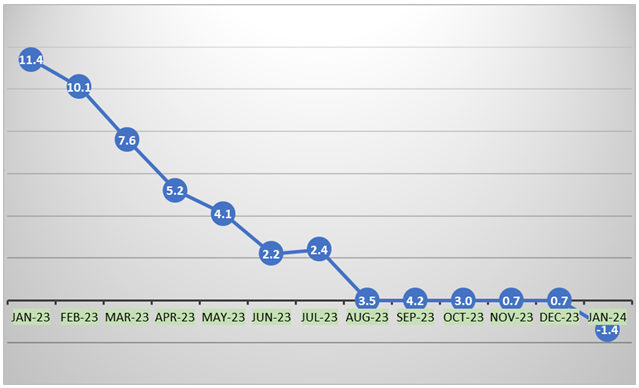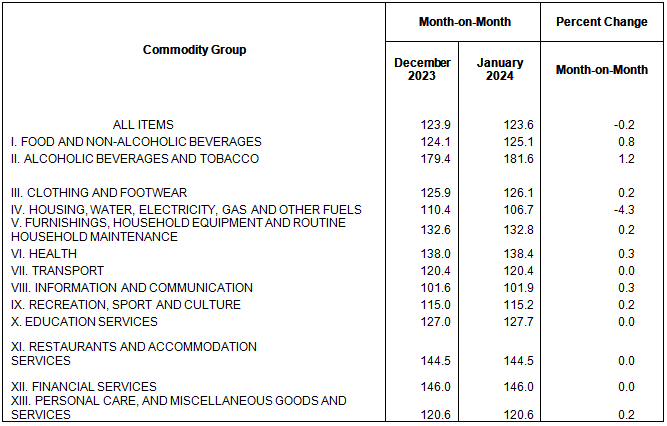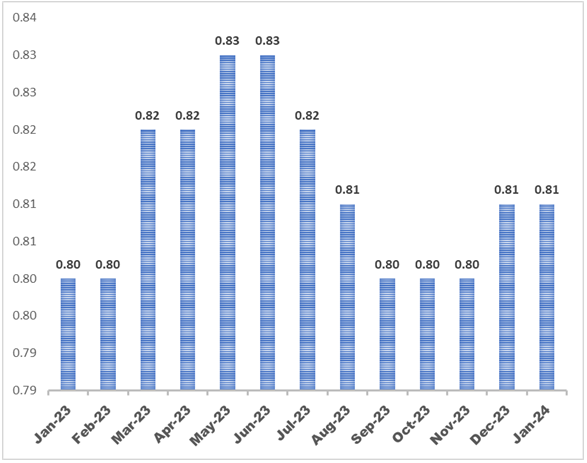Kalinga’s inflation for the month of January 2024 is recorded at -1.4 percent, notably lower than the 11.4 percent posted in the same period a year ago. Likewise, this month’s inflation is far lower than the 0.7 percent last December 2023.
Figure 1. Year-on-Year Changes of the Inflation Rate (%): Kalinga
January 2023 to January 2024
(2018=100)

PRICE SITUATION: Year-on-Year
The year-on-year situation is registered at -1.4 percent in all item indexes as an effect of the downward movement in prices in most commodities and service groups in December 2023 compared to the same period last year. Most of the following commodity groups reflected a decrease: Food and Non-alcoholic Beverages with -0.8 percent change (126.1 to 125.1); Housing, Water, Electricity, Gas, and Other Fuels with -7.3 percent change (114.0 to 106.7); and Transport with -4.2 percent change (125.7 to 120.4).
On the contrary, an increase was recorded in the price index of Alcoholic Beverages and Tobacco with 5.5 percent change (172.2 to 181.6); Furnishings Household Equipment and Routine Maintenance of the House with 3.8 percent change (128.0 to 132.8); Clothing and Footwear with 3.1 percent change (122.3 to 126.1); Health with 2.9 percent change (134.5 to 138.4); Personal Care, and Miscellaneous Goods and Services with 2.4 percent change (118.1 to 120.6); Recreation, Sport, and Culture with 2.0 percent change (112.9 to 115.2); Education Services with 0.9 percent change ( 126.5 to 127.7); and Information and Communication with 0.5 percent change (101.4 to 101.9).
Meanwhile, the price index of Financial Services remained at 146.0, and Restaurant and Accommodation Services at 144.5.
Table 1. Kalinga Consumer Price Index b y Subgroup, Year-on-Year
January 2023 to January 2024

PRICE SITUATION: Month-on-Month
In the month-on-month comparison, the consumer price index in All Items is posted at -0.2 percent a little bit lower from 123.9 in December 2023 to 123.6 in January 2024. The decrease on the monthly CPI of the month was the result of the price decrease of price from the group of Housing, Water, Electricity, Gas, and Other Fuels with -4.3 percent changes from 110.4 to 106.7.
On the contrary, there is an increase on the following items: Alcoholic Beverages and Tobacco with 1.2 percent changes from 179.4 to 181.6; Food and Non-Alcoholic beverages with 0.8 percent change from 124.1 to 125.1; Health with 0.3 percent change from 138.0 to 138.4; Information and Communication with 0.3 percent changes from 101.6 to 101.9; Clothing and Footwear with 0.2 change from 125.9 to 126.1; Furnishings Household Equipment and Routine Maintenance of the House with 0.2 percent change 132.6 to 132.8; Recreation, Sport, and Culture with 0.2 percent change 115.0 to 115.2; and Personal Care and Miscellaneous remain at 0.2 percent changes from 120.4 to 120.6.
Meanwhile, the price index of Financial Services, Transport, Education, and Restaurant and Accommodation remained at 146.0, 120.4, 127.7, and 144.5 respectively.
Table 2. Consumer Price Index by Commodity Group for All Income Households in Kalinga
December 2023 and January 2024
(2018=100)

Purchasing Power of Peso
The Purchasing Power of Peso (PPP) in Kalinga was valued at 0.81 this
January 2024, 1 centavo lower than the PPP of January 2023 with 0.80 centavos.Figure 3. Purchasing Power of Peso in Kalinga
January 2023 - January 2024
(2018=100)

Technical Notes:
Price – is the amount or value paid in exchange for the commodity or a service rendered.
Retail/Consumer Price – refers to the price at which a commodity is sold in small quantities for consumption.
Weight – a value attached to a commodity or group of commodities to indicate the relative importance of that commodity or group of commodities in the market basket.
Market Basket – a term used to refer to a sample of goods and services that are commonly purchased and bought by an average Filipino household.
Consumer Price Index (CPI) – is a measure of the average change overtime in the prices paid by urban consumers for a market basket of consumer goods and services.
Inflation Rate - is the percentage increase or decrease in prices during a specified period, usually a month or a year and it is derived from CPI. It is interpreted in terms of declining purchasing power of money.
Unit of Measure - refers to which a commodity is customarily traded in the market and it is the actual unit in which the associated values are measured.
Commodity Specifications – refers to the detailed description of the commodity such as a brand packaging, size and unit of measure or other characteristics that will best describe the product/commodity and are important in the determination of prices.
Uses of the CPI
As an indicator, the CPI is the most widely used in the calculation of the inflation rate and purchasing power of the peso. It is a major statistical series used for economic analysis and as monitoring indicator of government economic policy.
The CPI is also used as a deflector to express value series in real terms, which is, measuring the change in actual volume of transaction by removing the effects of price changes. The CPI also serves as inputs in wage adjustments through the collective bargaining agreements.
(SGD)
MARIBEL M. DALAYDAY
Chief Statistical Specialist

